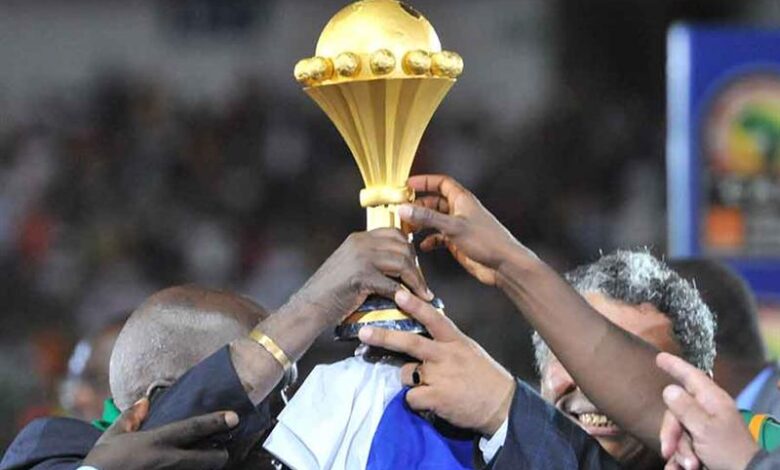Africa Cup Of Nations | History, Winners, Trophy, & Facts

The Africa Cup of Nations, the most esteemed football (soccer) competition in Africa, involves national teams and is administered by the Confederation of African Football (CAF). The format of the competition has evolved, starting with three teams in 1957 and expanding to 24 teams in 2019 after several adjustments. The rise in participation prompted the introduction of qualifying rounds in 1968, coinciding with CAF’s decision to host the tournament biennially.
The inaugural Africa Cup of Nations took place in February 1957 in Khartoum, Sudan, culminating in Egypt’s victory over the host nation in the final and securing the Abdel Aziz Abdallah Salem Trophy. This trophy, named after its benefactor, an Egyptian who served as the first president of CAF, was permanently bestowed upon Ghana in 1978 after becoming the first country to win the tournament three times. Subsequently, the African Unity Cup was introduced and permanently awarded to Cameroon in 2000 when the team secured its third championship since 1978. In 2002, a new trophy named the Cup of Nations was introduced.
The tournament has acted as a platform to showcase the skills of African players. During the 1950s and ’60s, the competition’s attacking and entertaining style of play captivated the imagination of African fans, drawing the attention of European talent scouts, agents, and journalists. The presidency of Ydnekachew Tessema, an Ethiopian who led CAF from 1972 until his passing in 1987, contributed to the cup gaining increased international prestige. Professionalism was sanctioned in 1980, and corporate sponsorships were embraced in 1984. Notable performers in the cup include Cameroon’s Samuel Eto’o, holding the record for the most career goals in the Cup of Nations (18), and Ivorian striker Laurent Pokou, who scored five goals in a 6–1 victory over Ethiopia in 1970.
Beyond the confines of the playing arenas, the Cup of Nations has served as a channel for expressing political values and ideas. With colonial institutions lacking indigenous symbols of national identity, numerous independent African governments have invested substantial economic and political resources in their national football teams to instill pride and foster unity among their diverse populations. For instance, under the enthusiastic support of Ghana’s inaugural president, Kwame Nkrumah, Ghana claimed victory in the cup in 1963 and 1965.
READ ALSO: Chelsea vs Luton: Confirmed Starting XIs for EPL Match
The 1996 tournament, won by South Africa’s racially diverse team on home soil, appeared to symbolize football’s ability to bridge the substantial social and economic disparities left by apartheid. Conversely, following Algeria’s triumph in the 1990 Cup of Nations, the Algerian government couldn’t leverage the victory. Fans celebrated the team’s success in Algiers by expressing support for the opposition Islamic Salvation Front, revealing political tensions.
The 2010 Cup of Nations experienced violent disruptions due to political turmoil. The Togo team bus, en route to the tournament, was attacked by separatist gunmen in the Angolan exclave of Cabinda, resulting in the death of two team officials and the bus driver. Subsequently, the Togolese team withdrew from the 2010 Cup of Nations, which proceeded with a reduced 15-team field.
The table provides a list of Africa Cup of Nations winners.
Africa Cup of Nations
| year | winner | runner-up |
|---|---|---|
| *Finals held in even-numbered years 1968–2012; held in odd-numbered years from 2013. | ||
| **Because of the COVID-19 pandemic, the 2021 tournament was held in 2022. | ||
| 1957 | Egypt | Ethiopia |
| 1959 | Egypt | Sudan |
| 1962 | Ethiopia | Egypt |
| 1963 | Ghana | Sudan |
| 1965 | Ghana | Tunisia |
| 1968 | Congo (Kinshasa) | Ghana |
| 1970 | Sudan | Ghana |
| 1972 | Congo (Brazzaville) | Mali |
| 1974 | Zaire | Zambia |
| 1976 | Morocco | Guinea |
| 1978 | Ghana | Uganda |
| 1980 | Nigeria | Algeria |
| 1982 | Ghana | Libya |
| 1984 | Cameroon | Nigeria |
| 1986 | Egypt | Cameroon |
| 1988 | Cameroon | Nigeria |
| 1990 | Algeria | Nigeria |
| 1992 | Côte d’Ivoire | Ghana |
| 1994 | Nigeria | Zambia |
| 1996 | South Africa | Tunisia |
| 1998 | Egypt | South Africa |
| 2000 | Cameroon | Nigeria |
| 2002 | Cameroon | Senegal |
| 2004 | Tunisia | Morocco |
| 2006 | Egypt | Côte d’Ivoire |
| 2008 | Egypt | Cameroon |
| 2010 | Egypt | Ghana |
| 2012 | Zambia | Côte d’Ivoire |
| 2013* | Nigeria | Burkina Faso |
| 2015 | Côte d’Ivoire | Ghana |
| 2017 | Cameroon | Egypt |
| 2019 | Algeria | Senegal |
| 2021** | Senegal | Egypt |
- AFCON
- Africa Cup of Nations




